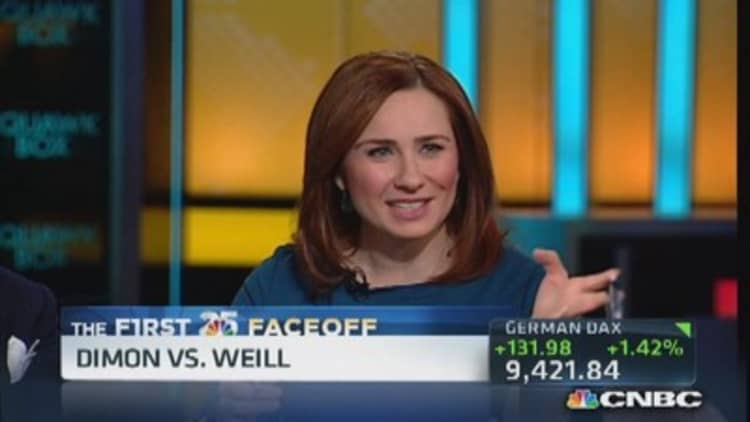Take the time machine back to 25 years ago, and financial markets are experiencing lingering effects of the 1987 stock-market crash. In response to the unexpected meltdown, Federal Reserve Chairman Alan Greenspan adds liquidity to the market by buying government securities.
Fast forward to 2014, and the markets don't look drastically different: Ben Bernanke steps down as the Fed chief with quantitative easing—a bond-purchasing policy established after the 2008 financial crisis—still in place.
History may repeat itself in financial markets, but if there's one thing unpredictable about Wall Street, it's the people in it.
(Read more: Finance kings: The bailouts, bonds and bubbles)
As CNBC celebrates its 25th anniversary, we're looking to find the top 25 most influential leaders of the past 25 years.
Like any other sectors, Wall Street has had its fair share of good, bad and ugly leaders. But their influence reaches far beyond the Street, says John Longo, a professor at Rutgers Business School.
Jamie Dimon is currently the top Wall Streeter in the CNBC 25 voting. The often blunt CEO of JPMorgan Chase rose up the ranks of Wall Street and, after being ousted from Citigroup by former CEO Sandy Weill, later went on to the top job at JPMorgan and is credited with leading the bank through the financial crisis relatively unscathed compared to other banks.
Of course, it hasn't been all smooth sailing: Dimon has navigated JPMorgan through the "London whale" trading debacle, a lawsuit over mortgage-backed securities and a lawsuit over the bank's ties with Bernie Madoff.
But, the head of America's biggest bank is still regarded as one of the best executives today, Longo said.
"Whether it's due to coincidence or due to his skill, there's been a tale of two cities between Citi and JP Morgan," he said. Dimon "was forced out of Citi, and Citi was ultimately near bankruptcy while JP Morgan thrived."
(Read more: Jamie Dimon vs. Sandy Weill: Who is more influential?)
Weill is also among the bankers in contention for CNBC's most influential of the past 25 years, along with Goldman Sachs CEO Lloyd Blankfein, former Goldman CEO and former Treasury Secretary Hank Paulson, and former Bank of America CEO Hugh McColl.

Beyond banking, other Wall Streeters on the list include Charles Schwab, who revolutionized asset management.
Schwab, who launched the discount brokerage that bears his name in 1971, is seen as a pioneer of do-it-yourself investing. The California native has made money management easier and more accessible for investors by rolling out services like online trading and no-commission exchange-traded funds.
Other investment managers on the list include Vanguard founder Jack Bogle and Fidelity leaders Ned and Abigail Johnson.
(Read more: Investors' love affair with mutual funds, ETFs will continue in 2014)
There's one group on Wall Street that has enjoyed a recent surge in its influence: activist investors, once called corporate raiders.
"Going back 25 years ago, the term 'corporate raider' was a bad term. Now you have 'activist investor,' which is a positive term," Longo said. "It's a relatively new dynamic."
Among the most famous is Carl Icahn, who's had a strong presence on the Street for decades. Icahn started taking positions in individual companies during the late '70s and has shaken up quite a number of corporations throughout his career: Nabisco, Viacom, Western Union, Time Warner, Dell, Netflix, Marvel. The list goes on.
(Read more: With huge warchests, activist investors tackle big companies)
He's constantly making headlines, whether it's for his aggressive attempts to stop a buyout at Dell when the PC maker was pushing to go private—a bid he ended up dropping—or for fights with another activist investor, Bill Ackman, over Herbalife. Icahn's Twitter feed alone may be a testament to his influence; he lifts and plunges stocks with just 140 characters.
It doesn't look like Icahn, currently in fifth place among Wall Streeters in the CNBC 25 voting, is going anywhere soon. His current campaigns include pushing eBay to sell off its PayPal business. Though the billionaire investor recently backed down from his fight with Apple for a stock buyback, he still may have won the battle; CEO Tim Cook announced Apple repurchased $14 billion of its shares.
Josh Brown, a financial advisor and blogger of The Reformed Broker, says it may even be worthwhile to look further than the Street for its forces of influence.
(Read more: Who did it better: Ben Bernanke or Mario Draghi?)
"Non-Wall Streeters who have had a big impact on Wall Street and the way people think about investing and finance should also be noticed," he said, pointing to economists like Robert Shiller and Jeremy Siegel.
Worry not if we're missing any of your favorite Wall Street folks. In the thread of ongoing comments, readers are sharing and celebrating achievements of names like bitcoin creator Satoshi Nakamoto, investor Peter Lynch and analyst Meredith Whitney.
Who do you think deserves a spot in the top 25? Click here to cast your vote.
(Read more: Milken to Madoff: Villains who changed the world)
—By CNBC's Jaewon Kang.





